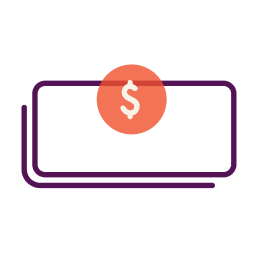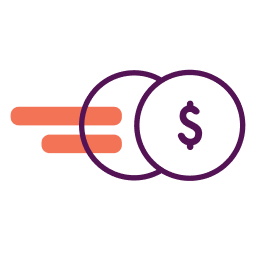Bank loans
Banks are the largest business lending institutions and probably the first place you think of when getting a small business loan. While bank term loans are some of the lowest-cost types of financing available, it can sometimes be difficult to qualify: many require high credit scores and longer time in business than alternative lenders do. But if you are able to qualify for a traditional bank loan, it can be an affordable way to maintain cash flow or get funds to expand your business.

Bank Loan Details
Loan Amounts
$250,000 – $1 million
Interest rates
4% – 13%
Repayment Terms
3 – 25 years
Turnaround Time
2 weeks – 6 months
Pros
- Very low, fixed interest rates
- Predictable monthly payments
- Helps build business credit
- Professional banker relationship
- Lending available for many uses
Cons
- Lengthy paperwork
- Longer wait time
- Requires strong credit
- Usually requires specific collateral
Banks usually require strong personal and/or business credit scores, a personal guarantee, collateral, and healthy financials. And applying also takes serious effort and time: the whole process can last about one to three months.
Still, if you are able to qualify for a traditional bank loan, it can be an affordable way to maintain cash flow or get funds to expand your business.
Get to know Bank Loans
Gerri Detweiler • January 7, 2021
How Do Bank Loans for Business Work?
A business loan works much as a personal loan does. Business loans are offered by banks (as well as other lenders) who, in exchange for the money they lend you, will charge interest on top of the loan amount and possibly an origination fee or annual fee. Typically, business term loans are paid back over a set amount of time, with regular repayments deducted from your business checking account. Lines of credit work similarly to credit cards.

Access better funding options with a solution you can’t get anywhere else
Reduce the pain in financing with streamlined applications, instant offers and approval rates that are 3.5X higher than industry averages
What You Need to Know About Bank Financing for Business Loans
As a long-term financing option, traditional bank loans have a lot going for them. At the same time, there are a few drawbacks you should be aware of before diving in.
Pros of Bank Loans
Pros
- Very low, fixed interest rates
- Predictable monthly payments
- Helps build business credit
- Professional banker relationship
- Lending available for many uses
Traditional bank loans typically have lower interest rates than other financing options like credit cards, payday loans, or short-term loans from online lenders. And you may build your business credit when you make on-time payments if the lender reports payments to commercial credit agencies. (Many banks report to the Small Business Financial Exchange and may report to other credit reporting agencies.)
There should not be a lot of surprises as you repay the loan: you’ll know the terms of your loan when you sign your loan agreement. However, keep in mind that payments on lines of credit will vary, depending on how much you borrow. Additionally some loans may have variable interest rates, which means payments may change if the interest rate they are tied to may change. And some loans may feature balloon payments. Make sure you understand the terms of your loan before you sign.
Many banks offer you the assistance of a professional banker or loan officer at a local branch you can turn to when you have questions about your loan or other financial products that might benefit your company.
And there are many things you can use your business loan for, from stabilizing cash flow to buying equipment or financing commercial real estate. Many banks also offer SBA loans.
Cons of Bank Loans
Cons
- Lengthy paperwork
- Longer wait time
- Requires strong credit
- Usually requires specific collateral
If you have less than perfect or even bad credit, you may have trouble qualifying for a traditional loan. Banks usually require strong personal and/or business credit scores, a personal guarantee, collateral, and healthy financials.
And if you’re in a hurry, you may be disappointed: these loans can take longer to apply for: the whole process can last about one to three months.
If you don’t have a solid credit history and financial profile, you will likely need to provide collateral for your loan — if you qualify at all. Traditional lenders like a bank don’t want to lend to borrowers that have a weak personal credit score or a shaky business credit profile.
Most banks prefer to make larger loans, so if you’re looking for a few grand, you might be out of luck at the local bank where you have a checking account or personal loan. Even loans of $50,000—$250,000 may be too small for some lenders, since the larger the loan, the more profit they make.
Banks are often slow to approve or reject applications, and the reasons for rejection are often not clear. Borrowers often complain about the lack of transparency in the approval process. (Learn more about what lenders do and don’t have to tell you when they reject a commercial loan.)
Your application may be rejected simply because your business operates in an industry in which the bank doesn’t make loans (or has already reached a maximum amount of loans for the year). Industries like real estate, retail, and restaurants may be considered a higher risk, for example.
And if you run a startup, you may find it more challenging to get a traditional bank loan; it’s unusual for traditional lenders to loan to startups. Many will require at least two years in business and some require four to five years of sufficient revenues.
Still, if you are able to qualify for a traditional bank loan, it can be an affordable way to maintain cash flow or get funds to expand your business.

Best Banks for Small Business Loans Offers
There are three primary types of financial institutions that offer business loans to consider.
Traditional Banks
This is usually a business owner’s first stop for small business financing. If you have a longstanding relationship with your bank — maybe you’ve had both business and personal checking accounts with them for decades or have taken out a personal loan or personal line of credit — you may be able to qualify for a better financing product than if you walked into a bank you had no relationship with.
Community Banks
These banks are often locally owned and operated. They are invested in their communities, and may be more flexible and helpful for business owners. You may have a more personalized experience at a community bank.
Credit Unions
If you’re a member of a credit union, this might be a good bet for a great interest rate on a business loan. Credit unions tend to beat larger traditional banks in terms of offers for loyal customers since they are nonprofits that don’t have to pay state or federal taxes, and they usually pass these savings onto customers. They may also offer loans in smaller loan amounts than traditional banks.
Alternatives to Bank Loans
In the event that you don’t qualify for a traditional bank loan, you do have other options, though be aware that they may come at a higher price.
Online Lenders
Technology has, of course, changed the lending industry, and now online lenders are competing with traditional banks in a major way. Many offer streamlined application processes and faster payment, so consider them as well. They do, however, tend to charge more in interest and have faster payback periods, usually just a few months to a year or two.
Startup Loans
If your startup hasn’t been in business for long, you probably won’t qualify for a bank loan, but know that there are lenders that specialize in loans for startups, and they usually have a lower threshold for time in business or credit scores to get approved.
Equipment Financing
If you’re looking to purchase a vehicle for your business, or maybe heavy machinery or kitchen equipment, equipment financing could be a good solution. The equipment you are purchasing acts as the collateral for the loan, and rates tend to be reasonable.
Invoice Financing
Another alternative to traditional financing is invoice financing. You borrow against the value of outstanding invoices, minus a fee to the lender.

Which Bank Loan Is Right For My Business?
Choosing the financial institution to apply for a loan with is just one decision. You also need to determine which specific type of small business financing is right for you.
First, will you need a secured loan? Secured loans require collateral while unsecured loans do not. Most unsecured loans require higher credit scores and solid financials, though typically these are only offered to a bank’s best and most creditworthy customers. If that doesn’t describe you or your business, you may need to put up collateral to get a loan. Some traditional banks may not lend you money without collateral.
Be aware that sometimes what’s called an “unsecured loan” is a bit of a misnomer: though they don’t require specific collateral, banks may rely on a UCC lien and personal guarantee to secure the loan. Technically, these loans are “secured” by that lien and guarantee, though they are touted as being unsecured.
As an FYI, if you are applying for an SBA loan through your bank, keep in mind that you aren’t automatically discounted from being approved for SBA loans if you don’t have collateral. The SBA will generally take collateral if you have it, though, and that can include personal assets like real estate.
Moving on, what are you looking to do with the funds you obtain? There are specific types of loans for different purposes, like real estate loans and equipment financing.
If your credit isn’t top-notch, you will need to look at online lenders, who may offer credit even if your scores are lower than what the bank might approve.
“It’s very competitive,” says Coleman. “There are a lot of lenders out there willing to make these loans. The entrepreneur has a lot of choices of which lender to work with.”
Curated funding options, smarter decisions
The world’s first financial health suite that streamlines access to the best financing options. Compare your top small business financing options, from over 160 financial products – with Nav.
What are the Requirements to Qualify for a Small-Business Bank Loan?
While requirements to qualify for financing with traditional banks may vary in the details from one lender to another, in general, they look for companies that have been in business a minimum of two years, and that have solid financials. They will want to look at bank statements and tax returns. They may also require financial statements, such as an up-to-date profit and loss statement or a balance sheet. They may also require a business plan to get a sense of your business’ financial health and plans for growth.
Most banks prefer to see annual revenues of $1 million or more, as well as a low personal debt-to-credit ratio. In general, you’ll likely need personal credit scores in the 700s, but some banks will approve a borrower with a personal score of 680+ provided other business metrics demonstrate a healthy business and the ability to service debt. The SBA will sometimes approve a loan to a borrower with a FICO score of 660.
Many banks may also have a minimum amount they want you to apply for, and may not fund loans under say $250,000, preferring to deal with loan amounts of $500,000 or $1 million or more. The SBA is encouraging its lenders (including credit unions) to approve loan amounts under $150,000 by reducing the fees to lenders in those small loan amounts.
Bank Loan Rates & Terms
The better your credit reports and credit scores, the more loan options you will have at the bank. For example, a business line of credit is only available to the most creditworthy borrowers. In other words, the more stable and low-risk you are, the better loan terms and more competitive rates you will likely qualify for.
That being said, good credit scores are not necessarily a guarantee of credit approval, but it does provide more options to a more qualified borrower.

Best Uses for Bank Loans:
Traditional bank loans are one of the business financing options (along with SBA loans) with the most diversity in terms of how you can use them to grow your business:
- Purchasing inventory
- Buying equipment
- Investing in commercial real estate
- Refinancing
- Acquiring other businesses
- Maintaining steady cash flow
- Debt consolidation
Purchasing Inventory
Borrowing to purchase inventory is a great use of capital, but you’ll want to make sure you understand the repayment terms.
A term loan from the bank typically does not offer loans with terms shorter than three or four years, so it might not be the best solution to meet short-term needs like purchasing quick-turnaround inventory. It doesn’t make sense to tie up capital making loan payments for several years for an asset, like inventory, that will be sold this year.
Buying Equipment
An equipment loan to pay for expensive equipment or machinery is a great use for a loan from the bank. The bank will likely use the equipment you are buying as collateral for the loan.
Investing in Commercial Real Estate
Many lending institutions offer commercial real estate loans specifically for buying land, office space, or retail space. SBA 504 loans may be another option, with the bank financing a portion of the loan. You may also use these loans to renovate or refinance real estate you already own.
Refinancing
If you already have a business loan that perhaps doesn’t have the best rates, you might decide to take out a new loan to refinance old debt. This might help you save money if the newer interest rate is lower than the old one, depending upon your loan purpose.
Be aware though, sometimes refinancing a short-term loan with a longer-term bank loan might reduce your periodic payment, but it could increase the total cost of the loan because more interest will accrue over the longer term. It might be an oversimplification, but most people would never buy a car with a 30-year mortgage or purchase a new home with a four- or five-year auto loan. In other words, short-term financing needs and longer-term financing needs are very different.
Acquiring Other Businesses
Ready to expand your empire? Not having the capital isn’t an excuse for a creditworthy business with a strong track record. If you’re looking to buy another business, a traditional bank loan could provide the funds you need to take your business to the next level.
Maintaining Steady Cash Flow
Running a business means that sometimes, cash flow will be bumpy. Having access to cash through a loan means you’ll always have the money you need to cover unexpected expenses, pay employees, and manage overhead.
This is another instance where a longer-term loan from the bank may or may not be the best solution depending on your business situation. A cash flow crunch is usually a short-term need and can sometimes be best met with a line of credit or other shorter-term financing.
Debt Consolidation
Another use for a loan is to consolidate debt. If you have balances on several business credit cards or loans, a debt consolidation loan can roll all those up into one monthly payment with one consistent interest rate that might help you save money. However, you’ll find that banks are often reluctant to make debt consolidation loans to borrowers with a significant amount of debt.

How to Apply for a Bank Loan
Each bank may have slightly different requirements for the application process, but you can expect to be asked for:
- Information on your business, including contact information, industry, business entity, and time in business
- Financials, including tax paperwork, bank statements, and balance sheet
- Owners’ or officers’ information
- Tax ID or social security number
Because bank loans can take a while to process, make sure you start the application well in advance of needing the funds. Spending a little extra time making sure you have everything you need can save time later.
Is a Business Bank Loan Right For You?
While there are many advantages of bank loans, you’ll want to carefully consider the pros and cons of applying for one. While banks may offer some of the best rates available, you have to be prepared to put in serious time and effort in the loan application process. Here are some other items to consider before pursuing a business bank loan:
You’ll likely need excellent credit to qualify. If you have poor credit, it may be worth waiting to apply for a business bank loan and working on your credit scores first. This will put you in the best position to get through the financing application process with relatively little difficulty down the road. (Get your free business credit scores here.)
Not all banks check or require good business credit. But if you don’t have high credit scores and/or a solid business credit history, you may fare better applying with online lenders for short-term loans or opening business credit cards to build your credit.
Banks want to see that your business is bringing in a healthy amount of cash flow. They will want to look at your business bank account statements to determine if you have a healthy enough average daily balance. They want to confirm that you have the cash flow to service debt. They will likely evaluate your business’ debt-to-credit ratio. Separating your personal and business finances is essential to help banks see what money your business is bringing in and boost your chances of getting a loan.
You’ll likely need to have an established business to work with a bank for business lending. Banks like to minimize their risk when it comes to small business loans, so you should expect they will require you to have a couple of years in business under your belt.
Banks will want to know the purpose of your loan. While bank loans are available for many uses, your lender will want to know how you are going to use the loan before offering you cash. And what you plan to use the money for may help a bank determine the best small business financing option for you. One use of a bank loan, for example, is to finance equipment. Bank equipment loans are often easier to qualify for than other bank loans because you can use the equipment being financed as collateral for the loan.
Nav’s Verdict: Bank Loans for Business
If you’re aiming to grow your business or simply keep cash flow even, business lending through traditional banks might be a good option.
But if you don’t currently qualify for a business loan, consider working on building your credit, so that, over time, you are more appealing to business bankers.
Related Resources
- SBA Loans
- Bank loans
- Merchant Cash Advance
- Microloans
- Cash Flow Loans
- Online Business Loans
- Construction Business Loans
- Retail Business Loans
- Restaurant Loans & Financing Options
- SBA 7(a) Loans
- SBA Express Loans
- Business Credit Cards
- Equity Crowdfunding
- Reward-Based Crowdfunding
- Equipment Financing
- Invoice Financing
- How Trade Credit Can Help Your Business
- Medical Practice Loans
- Manufacturing Business Loans
- Commercial Real Estate Loans
- SBA Microloans
- SBA 504 Loans
- SBA Disaster Loans
